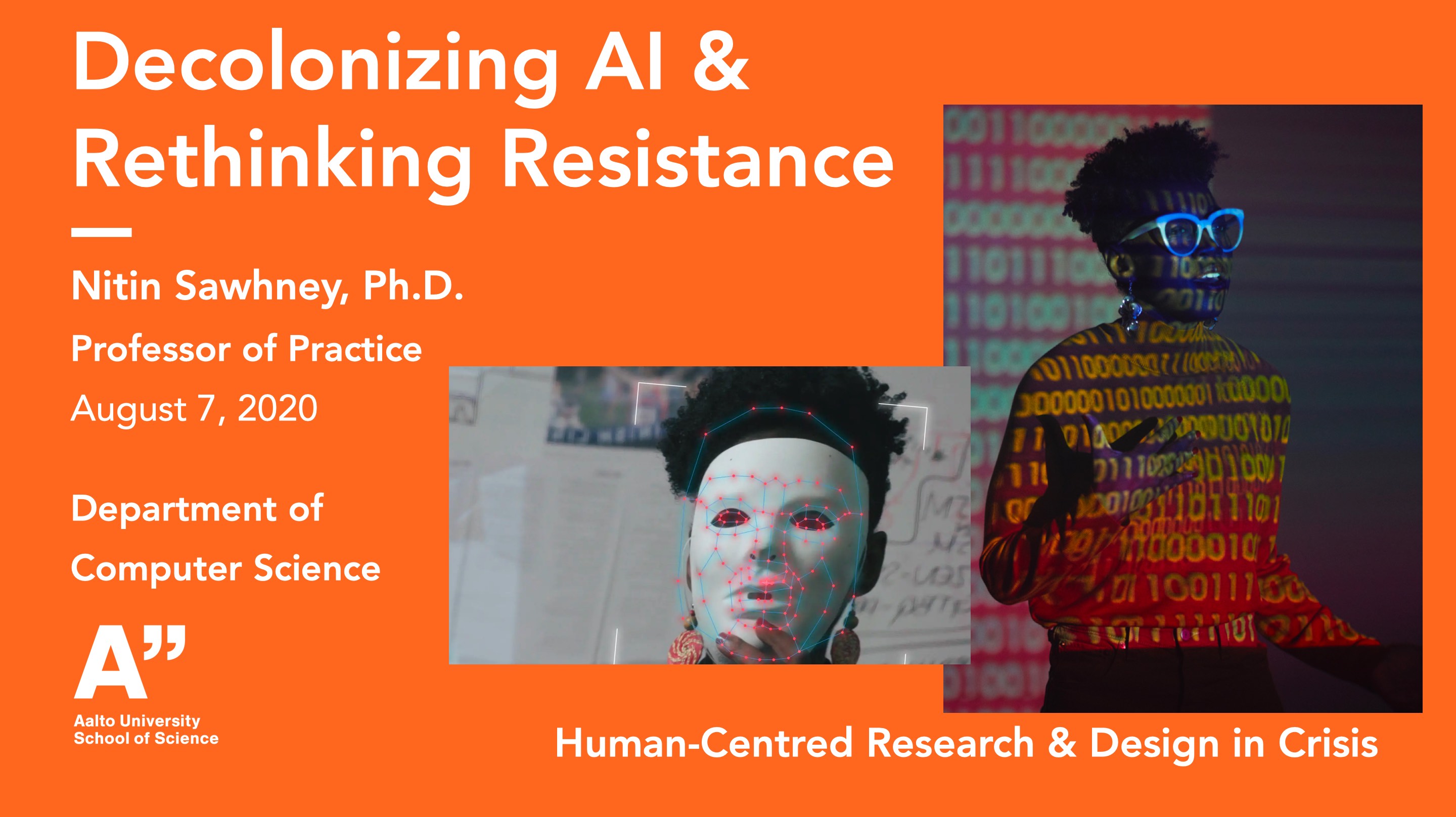CS-E4002 - Special Course in Computer Science: Human-Centred Research and Design in Crisis, 02.06.2020-01.09.2020
This course space end date is set to 01.09.2020 Search Courses: CS-E4002
WEEK 9: Ethics, Politics and Practices of AI in Society
Session 1: Ethics and Politics of AI in Society
Ethics and Politics of AI in Society, Prof. Nitin Sawhney, Department of Computer Science, Aalto University, August 3, 2020 (PDF slides)
Learning Outcomes:
1. Understanding the role and influence of ethics and politics in AI
2. Recognizing Bias, Fairness, Accountability and Transparency in AI
3. Examining ethical implications in real-world AI scenarios in society
Readings:
The Hitchhiker’s Guide to AI Ethics (3-part series), B. Nalini, May – June 2019.
AI Now 2017 Report, AI Now Institute at NYU, October 18, 2017.
Additional Reference:
The Politics of AI, Kate Crawford (video lecture), July 17, 2018.
Session 2: AI Ethics in Practice: Designing for Ecosystems
Learning Outcomes:
1. Understanding Ethics of Smart Cities and Data-Driven Urbanism in Crises
2. Recognizing Rights and Values of human, AI and non-human stakeholders
3. Applying Ethics in Practice for Designing Cooperative Urban AI Ecosystems
Readings:
Nitin Sawhney. 2020. Te Awa Tupua: Sacred Rivers and Cooperative Urban AI Ecosystems . Workshop on Urban AI: Formulating an Agenda for the Interdisciplinary Research of Artificial Intelligence in Cities, Conference on Designing Interactive Systems (DIS 2020), July 6-20, 2020, Eindhoven, Netherlands.
Rob Kitchin. 2016. The Ethics of Smart Cities and Urban Science. Phil. Trans. R. Soc. A 374: 20160115.
Additional Reference:
Gender Shades project by Joy Buolamwini (video & interactive website), 2018.
Session 3: Decolonizing AI & Rethinking Resistance

Learning Outcomes:
1. Participatory Session for discussion and reflection of AI Ethics
2. Applying perspectives from Decolonial Theory to AI
3. Rethinking Civic Resistance i.e. how AI can be leveraged for social justice
Readings:
Catherine D'Ignazio and Lauren F. Klein. 2020. Introduction: Why Data Science Needs Feminism. In Data Feminism. MIT Press.
Shakir Mohamed, Marie-Therese Png and William Isaac. 2020. Decolonial AI: Decolonial Theory as Sociotechnical Foresight in Artificial Intelligence. Philosophy and Technology (405).
Nani Jansen Reventlow. 2020. Data collection is not the solution for Europe’s racism problem. Al-Jazeera.
Additional References:
Joy Buolamwini, “AI, Ain’t I a Woman?”, Spoken word piece (2 min video) performed at Vision & Justice event at Radcliffe Institute for Advanced Study at Harvard University, April 26, 2019. Her response to algorithmic bias, or the fact that AI systems often either mischaracterize or fail to recognize dark-skinned faces. Joy Buolamwini, founder, Algorithmic Justice League, MIT Media Lab.
Catherine D’Ignazio, Feminist Data, Feminist Futures, Lecture (watch a 10 min excerpt from 14:50 onwards) at the Eyeo Festival, 2019. She examines the power in feminist imaginations and feminist futures, and the subject of her new book on Data Feminism.
Yeshimabeit Milner, Abolish Big Data, Lecture (watch a 10 min excerpt from 32:22 onwards) at the Newman Alumni Center, February 21, 2020. She is the founder of Data for Black Lives.
